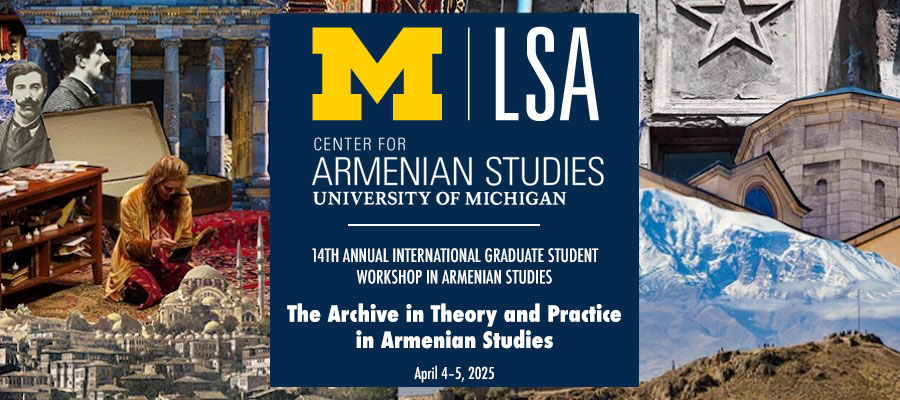The Archive in Theory and Practice in Armenian Studies, 14th Annual International Graduate Student Workshop in Armenian Studies, University of Michigan, April 4–5, 2025
The Center for Armenian Studies at the University of Michigan invites proposals for papers for the 14th Annual International Graduate Student Workshop, to be held on Friday, April 4th & Saturday, April 5th, 2025. This conference will be in-person at the University of Michigan, Ann Arbor campus, under the title “The Archive in Theory and Practice in Armenian Studies.”
This year’s workshop seeks to uncover the ways scholars engage with archives in their work in Armenian Studies research, both in theory and in practice. While “the archive” in humanities and social science scholarship is often invoked through metaphorical and conceptual terms to mean history or canon as a whole, this workshop encourages applicants to both seriously engage with, and play with the bounds of, archival theory.
For instance, how might we expand our notion of what the archive is, how it is formed, and by whom it is shaped? In what ways do formal and institutional archives need to be rethought in order to better represent the Armenian community, or subsets of the Armenian community? In what ways might the Western construction of archives hinder or preclude preservation of a displaced or destroyed Armenian history? What practical challenges are faced by scholars undertaking archival research or using primary sources, and what new solutions or innovations are being proposed to overcome them? This workshop seeks presentations that address these questions, ask new ones, or are exploring an entirely different direction for archival research in Armenian Studies. Applicants should engage with archives in a meaningful way, yet need not be steeped in archival literature; this conference seeks to engage scholars working with “archives” in ways they themselves deem significant.
Topics addressed may include, but are not limited to:
- Politics of collecting and recordkeeping
- Primary source usage in Armenian institutions
- Reimagining or redefining formal and institutional archives
- Gaps, silences, deletions, or omissions in existing archives
- Displacement and/or rebuilding of archives or archival institutions
- Use and misuse of primary sources
- Practical challenges and solutions to archival access
- Metadata and finding aids of Armenian records and collections
- Categorization and organization
- Curatorial practices of Armenian records
- Materiality
- Ephemerality and preservation
- Cross-cultural and cross-linguistic archives
- Oral history, storytelling, and narrative tradition
- Digital archives and emerging technologies
- Public history, exhibition, access, or exposure
- Legal policies and governance
- The formation of a contemporary archive
- Personal reflections on primary source use
